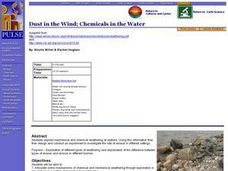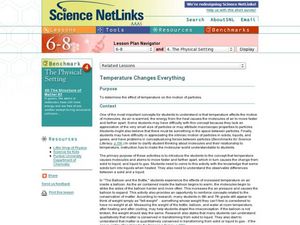K5 Learning
Changes
You can't unring a bell, but can you unmelt an ice cube? Readers consider reversible and irreversible changes with a short informational reading passage and accompanying comprehension questions.
Center for Learning in Action
Introduction to the States of Matter
Liquids, gases, and solids are the states of matter in which scholars investigate in a lesson plan that offers in-depth information and engaging activities that look into the three states and the changes their properties make when mixed...
Curated OER
Changing Planet: Withering Plants - Stressing Over Lost Water
Expectant earth scientists examine the bottom side of a leaf and learn the role of the stomata. They consider the gas exchange that occurs through these structures and relate how the climate is changing to its impact on food crops. This...
Curated OER
A Device That Condenses Water
Fifth graders who are studying water vapor and the condensation process use this worksheet to help them understand the process of condensation. Most of the worksheet is simply a source of information, with a good descriptive paragraph...
Curated OER
Water Cycle Reading and Writing
After listening to a story about the water cycle, learners create their own versions of this tale. This is a great way to have your class review the concepts of evaporation, condensation, precipitation, and runoff.
Curated OER
Water Cycle Reading and Writing
Here is a great way to get pupils to express a scientific concept in a fun way. After hearing the story of Walter the Water drop and learning facts about the water cycle, the class will write a creative expository piece describing what...
Curated OER
Water and Ice
Students will observe, measure and describe the phase changes of ice. For this science lesson plan, students observe ice as it changes phases. Qualaitative notations made by individual students will be shared and compared.
Curated OER
Water 1: Water and Ice
Young scholars examine the changes as water goes from solid to liquid. In this states of matter lesson, students observe and record the changes to water as it changes from solid to liquid and back to solid.
Curated OER
Chemical Changes in Matter
In this matter and chemical changes activity, students write symbols and formulas for 2 chemical reactions. They write words for 1 chemical reaction given in symbols and formulas. They draw a diagram representing a chemical reaction and...
Curated OER
Dust in the Wind; Chemicals in the Water
Students explore mechanical and chemical weathering at stations. They articulate some mechanisms of chemical and mechanical weathering through exploration in a lab. Students stations describe how chemical weathering differs from...
Curated OER
Changes in Matter
Eighth graders, in groups, explain the difference between physical and chemical changes.
It's About Time
States of Matter: Solid, Liquid, and Gas
Solid, liquid, and gas: they all matter. Scholars create an animation of the various states of matter, experiment with the temperature of water as it changes states, and observe carbon dioxide as it changes states. The lesson also...
American Chemical Society
Molecules Matter
Did you know that jumping spiders sometimes wear water droplets as hats? A seventh grade science lesson introduces the concept of what makes up water: tiny molecules that are attracted to each other. Starting with a chemistry discussion,...
Virginia Department of Education
States of Matter
Scientists have been studying exothermic reactions before they were cool. The lesson begins with a discussion and a demonstration of heat curves. Scholars then determine the heat of fusion of ice and the heat needed to boil water through...
Curated OER
Water and Ice
Students investigate how water changes state. In this water lesson, students observe, measure, and describe water as it changes state. This lesson includes extensions which can be accessed via the provided web links.
Curated OER
Water and Ice
Young scholars explore water as it changes states of matter. In this physical property lesson, students use observation, measurement, and communication skills to describe changes in water as it goes from a solid to a liquid and back again.
Curated OER
Water and Ice: Part 1
Students observe the state changes in water. In this matter lesson, students observe, measure, and describe water as it changes state. Students explore how water can change from a solid to a liquid then back again. They journal their...
Curated OER
Water and Ice
Students explore water. In this water lesson, students explore the physical properties and states of water. They observe how water changes states and document what they see.
Curated OER
Water and Ice
Students explore the physical properties of water. In this water lesson, students observe, measure, and describe water as it changes state. There are 2 extensions for this lesson that one can access via the Internet links provided.
Curated OER
Properties of Matter
Young scholars describe four states of matter and their characteristics, explain thermal expansion of matter, interpret state changes in terms of kinetic theory of matter, explain relationship between temperature and volume of a gas,...
Curated OER
Chemical Changes
Fourth graders examine and identify chemical and physical changes in a variety of substances. They observe a vinegar and baking soda demonstration, and a water, laundry detergent, and Epsom salt mixture demonstration. They discuss the...
Curated OER
Putting the Ice in Hockey
Eighth grade physical science classes examine why the ice on which hockey is played is slippery. They do so by discussing phases of matter and the molecular motion in each. They read an article on a website and write out answers to 10...
Curated OER
Temperature Changes Everything
Middle school chemists visit interactive websites in order to discover what happens to molecular motion when heat is added to matter. They conduct an experiment that demonstrates the expansion of matter with the addition of heat. A lab...
Curated OER
Properties of Matter
A collection of ten slides reveals bright graphics and photos. Though the title is "Properties of Matter," the content is incoherent. You will find a couple of slides on chemical reactions, a few on the example of the S.S. Hindenburg...

























